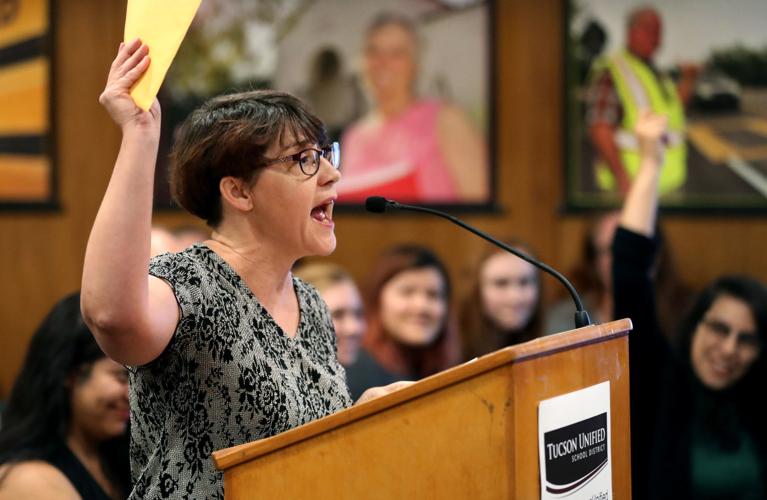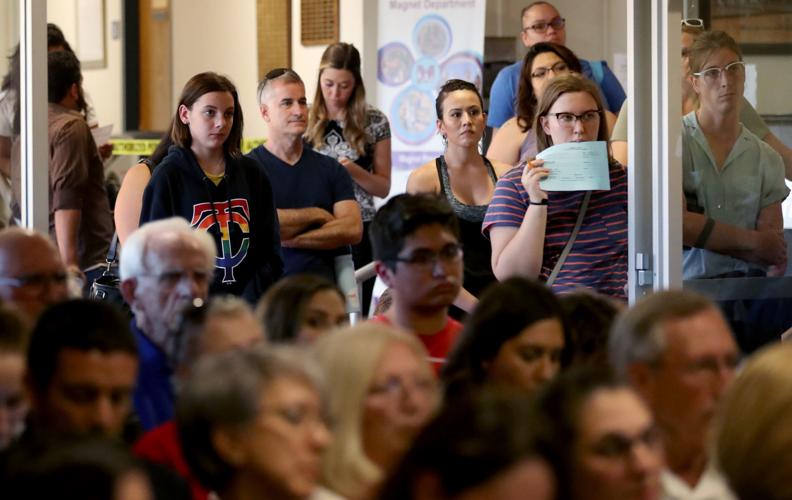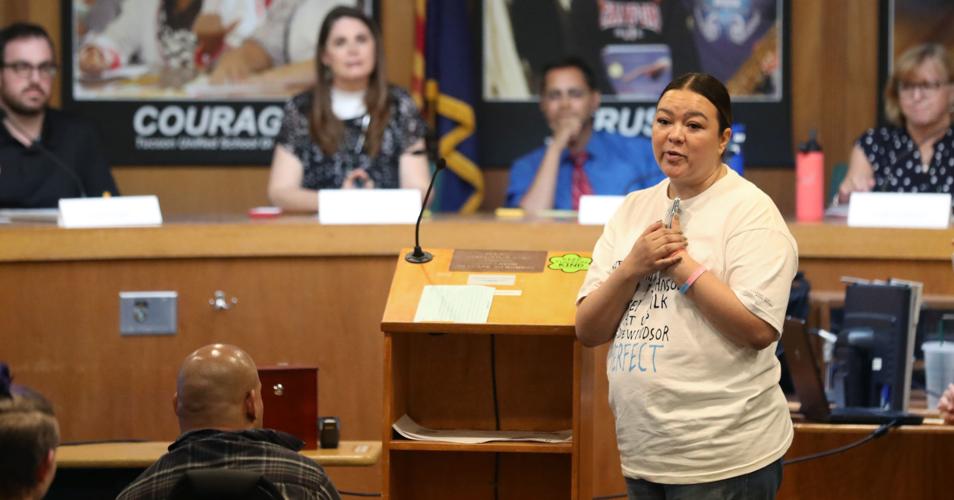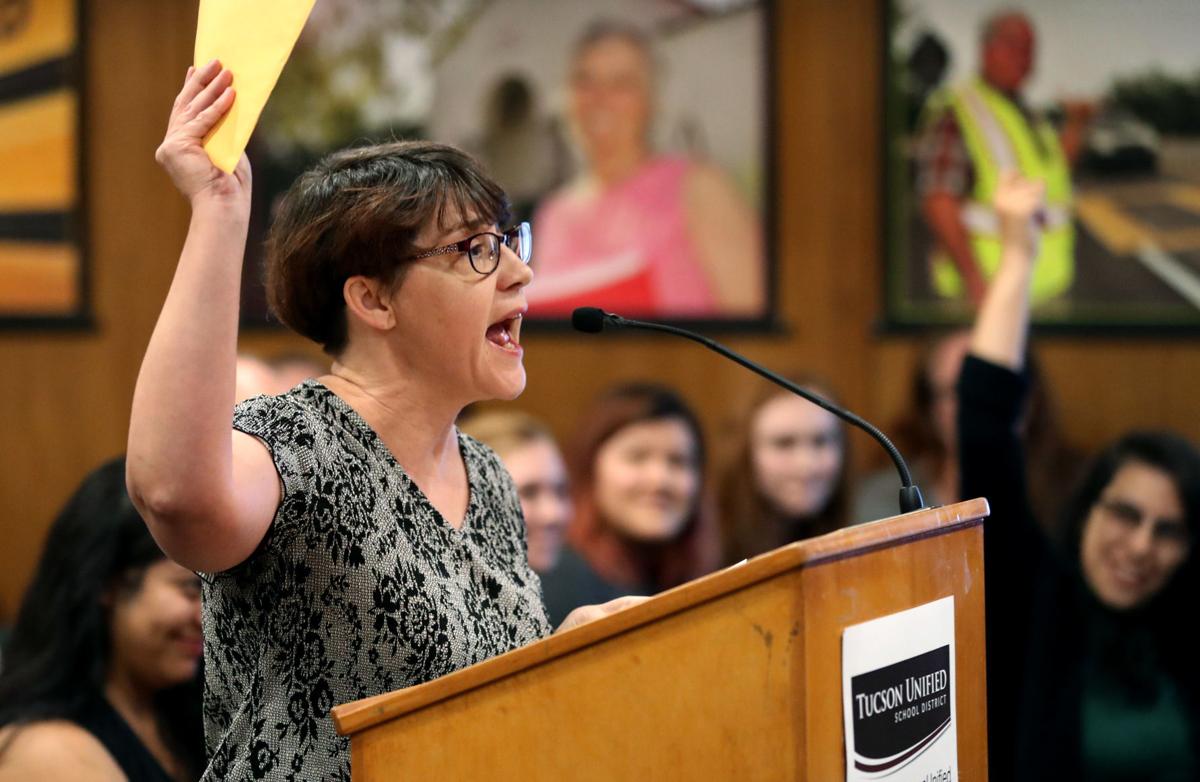LGBTQ-identifying students attending Tucson Unified schools could see better representation in their sex education classes as soon as next school year, if the district Governing Board approves a curriculum update.
The update, if passed, would make TUSD’s sex ed, or “family life,” curriculum one of the most LGBTQ-inclusive, comprehensive and medically accurate offered in Tucson-area public school districts, the Arizona Daily Star found.
The proposed curriculum won’t be available for public review, though, until shortly before the board takes an initial vote on the update — likely in mid- to late July.
The program hasn’t been updated in more than 20 years, members of the update committee say.
Volunteers working on the update have confirmed the new sex ed curriculum, though still in flux, would be offered every year in fourth through eighth grades. High schoolers would go through it only once during health class, which is a graduation requirement in TUSD.
The curriculum seeks to include LGBTQ students by using less hetero-normative and gender-normative language, and by showing kids that families don’t look one way — some kids have one mom and one dad, while others have two moms and two dads, committee members said.
The actual language used in the curriculum would also be more gender-neutral, utilizing they-them pronouns throughout the lessons instead of gendered he/his and she/her pronouns.
“We do our students a disservice when we exclude. … Being inclusive doesn’t only benefit students in the LGBTQ community; it benefits everyone in the room,” said Dr. Ravi Grivois-Shah, a family physician at Banner who has served on the family life committee since March.
It is important to educate every student, regardless of their sexual orientation, gender identity or sexual experiences, because it equips them with knowledge they need to navigate society for the rest of their lives, Grivois-Shah — who identifies as gay himself — said.
“In my professional opinion, this is in the best interest of our students,” he said.
The proposed changes to the curriculum fit the policies and statements of many major medical organizations in the United States, Grivois-Shah said, including the American Academy of Pediatrics, the American Medical Association and the American Psychiatric Association.
“I think we’re following best guidelines and best practices,” he continued.
The committee says it has also adjusted language so that it doesn’t shame students — primarily those who identify as girls — for being victims of sexual violence or for choosing to be sexually active during their teen years.
That said, the updated curriculum will still stress that abstinence is the only 100% effective way to prevent pregnancy and sexually transmitted infections, which is legally mandated by the Arizona Administrative Code.
“The curriculum we’re creating isn’t perfect — nothing’s perfect — but it is better than what we had before,” Grivois-Shah said.

The crowd spills into the hallway after filling the approximately 120 seats in the meeting room at the TUSD’s family life committee meeting on June 26. The new sex education curriculum, if approved, would likely be offered every year in fourth through eighth grades.
High schoolers would go through it only once during health class, which is a graduation requirement in TUSD.
Several YEARS IN THE MAKING
Providing TUSD students with inclusive, age-appropriate information related to the myriad topics sex ed covers — from respecting personal space, to puberty, to sex itself — has been the curriculum update committee’s goal since it reconvened earlier this year in March, said the Rev. Stephanie Hamilton, who has volunteered on the committee since its inception in 2016.
The TUSD Governing Board formed the family life committee in 2016 after student activists from University High School told board members the district’s sex education failed students.
“It was a group of just these whip-smart kiddos who were like, ‘This is crap,’” Hamilton said.
The University High students told the board they didn’t want or benefit from an abstinence-only sex education, Hamilton said — that it disregarded the way many students live their lives and shamed them for engaging in sexual acts.
The students also demanded the curriculum include more representation of the LGBTQ community — for students to see and learn about sexual orientation and gender identity in a way that didn’t make outcasts of already-marginalized kids.
The original 12 or so members of the family life committee struggled to come to a consensus on the students’ requests, Hamilton said.
Many members wanted to modernize the curriculum in the ways the University High students sought, but many resisted. Opponents worried reproductive-health organizations like Planned Parenthood might get involved, which they said didn’t belong in the classroom.
“Truly, people’s hackles were up,” Hamilton said.
Some people’s hackles are still up, according to some community members’ comments at a recent public forum about the updates.
A small number of participants voiced concerns about potential changes to the sex ed curriculum.
Audience member Paul Parisi said the district should “seek biblical solutions to problems” outlined in sex ed classes. Fernando Gonzalez, a TUSD grandparent, said he didn’t support a curriculum that might expose students to “pornographic” material. Barry Julian said TUSD shouldn’t teach students about anal or oral sex at all and should “leave the birds and the bees up to the parents.”
Most of the people who showed up to speak during the call to the audience, though, supported a more LBGTQ-inclusive, less abstinence-focused sex ed curriculum.
Will Kleiner, a student at University High, spoke about how inclusive sex ed could have helped him, a transgender boy, feel less alienated as he came to understand his gender identity.
When Kleiner first began to realize he identified as a boy, he struggled. He didn’t know if there was a word to describe the way he felt, or if there were people out there who felt like he did.
Eventually, he learned there were people who felt the way he did and identified as transgender.
“I found out there was a word for it,” Kleiner said, fighting back tears. “And it was so freeing because I was in a dark place. … I found out there was something else I can be.”
Kleiner urged the committee to include lessons about gender identity and the spectrum of sexuality in the updated curriculum.
“I think that we need education about all of these different things, because you know what’s confusing? Not knowing a word for it, seeing people are changing, but not understanding what they are becoming,” Kleiner said.
“I feel that in our program, there deserves to be at least a spot of ‘there is something else, there’s another way to be.’”

Lizette Trujillo turns to the audience while talking about her own experiences her son faced from bullying while speaking to TUSD’s family life committee during an open comment meeting concerning proposed changes to the district’s sex education programs on June 26, 2019, Tucson, Ariz.
WHAT OTHER DISTRICTS ARE DOING
TUSD is the only local school district actively working on any sex ed curriculum updates, but officials of some other local districts told the Star they are open to the idea in the future — especially in the wake of Arizona’s anti-LGBTQ “No Promo Homo” law being repealed in April.
The law, enacted in 1991, made it illegal for schools to “promote a homosexual lifestyle,” “portray homosexuality as a positive alternative lifestyle” or “suggest that some methods of sex are safe methods of homosexual sex” when teaching students about HIV and AIDS.
Currently, eight of Tucson’s nine largest school districts offer some degree of sex education.
None actively educate students about sexual orientation or gender identity, as TUSD’s updated curriculum could do, if passed.
The curriculums, for the most part, tend to hit on similar topics and emphasize to students that abstinence is the only 100% effective way to prevent unintended pregnancies and sexually transmitted infections.
Sahuarita Unified, Flowing Wells Unified and the Vail School District offer students the opportunity to go through Arizona Youth Partnership’s “Choosing the Best” sex ed program.
The program stresses to students that delaying sex until they are in a committed, healthy relationship is the best way to avoid “sexual risks,” said Melissa Romero, the youth and family outreach coordinator at Arizona Youth Partnership.
“We’re not in denial. We understand that there are going to be some teenagers that do not wait until they are in a healthy, committed relationship to have sex,” Romero said. “But it would also be irresponsible of us to not make them aware of the risk.”
Partnership facilitators present participating students with strictly factual and evidence-based lessons about human sexuality and development, Romero said.
The organization adjusted the language used in the program three years ago so that it was more inclusive of students who aren’t straight or don’t identify with the gender they were assigned at birth, she added.
“So rather than using terms that isolate students, like ‘If you’re a guy you obviously have a girlfriend’ … we make sure to tell our students they have ‘a partner’ in general,” Romero said. Facilitators also use the term “healthy, committed relationship” instead of marriage, she added.
Despite utilizing more inclusive language, the program doesn’t educate students about the multitude of different sexual orientations and gender identities people can have, Romero said.
Sahuarita offers the program during middle and high school. In fourth grade, students can take part in a different program, from Procter & Gamble, which teaches students about aspects of human growth and development like puberty and menstruation. The district doesn’t track opt-in rates for either program.
Flowing Wells Unified offers the Youth Partnership program during eighth grade and in 10th grade during health class. Roughly 98% of students at Flowing Wells Junior High opted in this school year, Superintendent David Baker said. The district could not provide the Star with opt-in rates for Flowing Wells High School by deadline, but Baker said, “Few, if any (students), do not return the permission to participate.”
Vail works with the Pima Prevention Partnership to offer Choosing the Best to middle and high schoolers, said district community relations director Heather Stough. This school year, 98% of high schoolers opted into sex ed, according to data Vail provided to the Star, while 87% of middle schoolers opted in.
Amphitheater Public Schools offers a “maturation curriculum” in grades five through eight and during biology in high school, said Roseanne Lopez, the district’s associate superintendent for elementary education.
The curriculum focuses on acquainting students with the biology of the human body and how it changes as students go through puberty into young adulthood. Amphi doesn’t track opt-in rates for sex ed, but said the “vast majority” of students participate, despite not having data.
Lopez said Amphi doesn’t need to update its curriculum to educate students about LGBTQ identities, despite the repeal of “No Promo Homo.”
“We don’t need to … because our curriculum is really based in biology,” Lopez said. “We don’t say anything about marriage, we don’t say anything about same-sex or heterosexual (relationships). We don’t say any of that. It’s ‘this is how it works.’”
Sunnyside Unified offers sex ed during eighth and ninth grades. It also offers a separate curriculum for pregnant or parenting girls enrolled in the district’s Teenage Parent High School program.
Though the curriculum stresses abstinence, as required by Arizona law, it also teaches students about various forms of birth control and condom use — though it doesn’t “promote pills,” said Eugenia Favela, Sunnyside’s assistant superintendent of student services.
The curriculum doesn’t explicitly address LGBTQ identities or any psychological or emotional aspects of sexual orientation or gender identity, Favela said, though the district strives to make “all youth” feel supported during sex ed.
“(The lessons are) saying, ‘Look, this is how your body works and this is what can happen if you have sex,’” Favela said. Roughly 96% of students opt-in to sex ed, Favela said, but she didn’t provide data to back the figure up.
Tanque Verde Unified weaves aspects of sex education into its “growth and development” curriculum, said Scott Hagerman, the district’s superintendent.
The program addresses anatomy and physiology, nutrition, personal care, exercise and emotional changes, Hagerman said. School nurses teach the program to students in fifth and sixth grades.
The lessons don’t teach students about pregnancy or STI prevention and don’t get into gender or sexual identity, Hagerman said. Tanque Verde doesn’t track student opt-in rates.
Catalina Foothills also offers sex ed during its “human growth and development” curriculum, which is offered to students in grades four through nine.
The lessons included in the curriculum strive to provide students with medically accurate information on topics related to sexuality, including abstinence, contraception, disease prevention and relationships, district spokeswoman Julie Fabarik said. Catalina Foothills does not track student opt-in rates.
Marana Unified is the only district in the Tucson area that doesn’t offer sex ed, the Star found.
THE PATH FORWARD
The TUSD Governing Board will vote on the proposed curriculum changes at its special meeting July 23, if all goes as planned.
The physical curriculum will be available for public review on TUSD’s website at least 24 hours before the board votes. After the initial vote, the board would accept public comments before final adoption at a later date.
Board members Adelita Grijalva, Kristel Foster and Leila Counts plan to support any changes that would make the curriculum more inclusive for LGBTQ-identifying students and less shaming toward students who are survivors of sexual violence, they told the Star.
Grijalva said she made it a point to appoint two gay men to the curriculum update committee — first, now-state Rep. Andres Cano, and later Adam Ragan, a social-studies teacher who ran for the TUSD board in 2018.
“I wanted to make sure that they (Cano and Ragan) were able to speak up for our students that didn’t feel like they were being represented by the curriculum at all,” Grijalva said. “I think that’s important.”
Foster said listening to LBGTQ-identifying students speak about their experiences during the June 26 public forum opened her eyes to their pain in a way she hadn’t been able to comprehend previously.
“I feel an urgency like I’ve never really felt before,” Foster said. “I will do everything I can to make sure this is adopted, right now.”
Inclusive sex ed is especially important to Counts, who foster-parented a transgender student attending a TUSD high school 19 years ago.
Counts saw firsthand how a lack of understanding concerning the scope of gender identity and expression led students to bully her foster child, which eventually caused them to run away from home.
“It was a really heartbreaking experience and the reason why this issue is so important to me on a personal level,” Counts said.
Board member Mark Stegeman would not comment on the potential changes until the board votes.
Board clerk Rachael Sedgwick did not respond to a request for comment.







